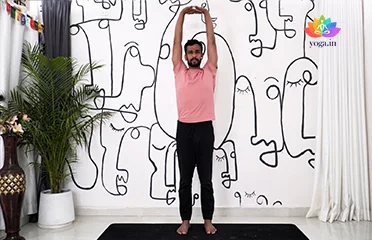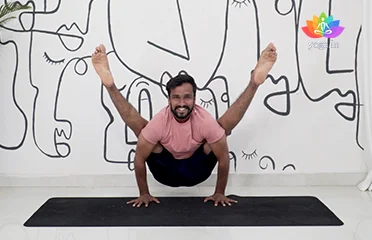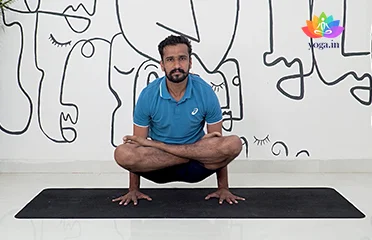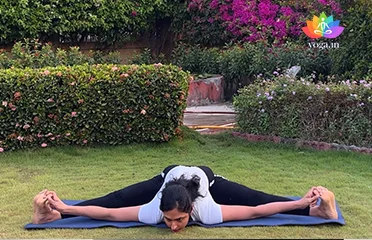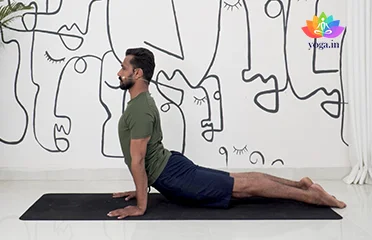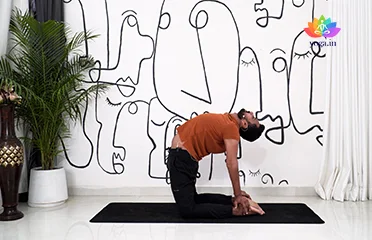Tadasana (Mountain Pose)
ताड़ासन / Mountain Pose
The sanskrit name is derived from tada (ताड़ा) meaning mountain and [�K]
Tittibhasana (Firefly Pose)
तिट्टीभासन / Firefly Pose
The Sanskrit name is derived from Tittibha (तिट्टीभा) meaning [�K]
Trikonasana (Triangle Pose)
त्रिकोणासन / Triangle Pose
The sanskrit name is derived from three Sanskrit Words: Tri (त्रि) meaning [�K]
Tulasana (Scale Pose)
तुलासन / Scale Pose
The Sanskrit name is derived from Tula (तुला) meaning balance and asana [�K]
Upavishta Konasana (Wide-Angled Seated F
उपविष्ट कोनासन / Wide-Angled Seated Forward Bend
The Sanskrit name is derived from Upavistha (उपविष्ट) means open/seated, [�K]
Urdhva Mukha Svanasana (Upward-Facing Do
ऊर्ध्वमुखश्वानासन / Upward-Facing Dog Pose
The Sanskrit name is derived from Urdhva (ऊर्ध्व) meaning up, Mukha [�K]
Ushtrasana (Camel Pose)
उष्ट्रासनI / Camel Pose
The Sanskrit name is derived from Ushtra (उष्ट्रासनI) meaning [�K]
Uttanapadasana (Raised Leg Pose)
उत्तान पादासन / Raised Leg Pose
In Sanskrit, Uttana means 'raised', and pada means 'leg'; thus, Uttanpadasana [�K]
Utthita Hastapadangusthasana (Extended H
उत्थिता हस्तपदंगुष्टासना / Extended Hand-To-Big-Toe Pose
The Sanskrit name is derived from Utthita (उत्थित) meaning "extended", [�K]
Vasishtasana (Side Plank Pose)
वसिष्ठासन / Side Plank Pose
The Sanskrit name is derived from Vasistha (वसिष्ठा) meaning wealthy [�K]
- 1
- 2
- 3
- 4
- 5
- ...
- 6
- 7
Yoga Poses for Pelvic Health: Find Strength and Relief
The pelvic floor muscles are a hammock of muscles that support your bladder, bowels, and reproductive organs. Strong pelvic floor muscles contribute to overall urinary and bowel control, sexual health, and core stability. Yoga offers a range of poses and practices that can benefit your pelvic health.
Understanding Your Pelvic Floor:
Your pelvic floor is like a hidden core, and just like any other muscle group, it needs to be exercised to stay strong and healthy. Weak pelvic floor muscles can lead to issues like incontinence, pelvic organ prolapse, and pain.
Yoga’s Role in Pelvic Health:
Yoga offers several benefits for pelvic health:
- Strengthens Pelvic Floor: Certain yoga poses engage and strengthen the pelvic floor muscles, improving control and reducing leakage.
- Improves Circulation: Gentle movements and breathing exercises enhance blood flow to the pelvic region, promoting healing and reducing pain.
- Reduces Stress: Stress can worsen pelvic floor dysfunction. Yoga’s calming nature promotes relaxation and stress reduction, which can improve overall pelvic health.
Key Factors Affecting Pelvic Health:
Several factors can affect your pelvic floor health, including:
- Pregnancy and Childbirth: Pregnancy and childbirth can stretch and weaken the pelvic floor muscles.
- Age: As we age, our pelvic floor muscles naturally weaken.
- Weight: Excess weight puts extra strain on the pelvic floor.
- Chronic Coughing: Activities like chronic coughing can weaken the pelvic floor.
- Lifestyle: Lack of exercise and poor posture can contribute to pelvic floor issues.
Symptoms of Pelvic Floor Dysfunction:
Common symptoms of pelvic floor dysfunction include:
- Urinary Incontinence: Leaking urine unintentionally, such as with coughing or sneezing.
- Pelvic Organ Prolapse: Organs in the pelvis dropping down into the vagina.
- Pelvic Pain: Pain in the lower abdomen, genitals, or lower back.
- Constipation: Difficulty passing stool.
- Painful Intercourse: Discomfort during sexual activity.
Treatment of Pelvic Floor Dysfunction through Yoga and Pranayama:
Here are some specific yoga poses and pranayama exercises beneficial for pelvic health:
- Kegel Exercises: These targeted contractions strengthen the pelvic floor muscles. You can incorporate them into various yoga poses.
- Bridge Pose (Setu Bandhasana): Opens the hips and strengthens the pelvic floor muscles.
- Child’s Pose (Balasana): Promotes relaxation and relieves pelvic tension.
- Garland Pose (Malasana): Strengthens the legs and core, indirectly supporting the pelvic floor.
- Deep Breathing (Pranayama): Improves circulation and promotes relaxation, beneficial for overall pelvic health.
Diet for Pelvic Health:
A healthy vegetarian diet rich in fiber and fluids can help maintain bowel regularity and reduce straining, which can benefit your pelvic floor. Here are some dietary recommendations:
- Hydration: Drink plenty of water throughout the day to stay hydrated. Dehydration can contribute to constipation, so ensure you’re consuming enough fluids.
- High-Fiber Vegetables: Include a variety of high-fiber vegetables in your diet, such as broccoli, Brussels sprouts, okra, lentils, and beans. Fiber helps soften stool and promotes regularity.
- Whole Grains: Opt for whole grains like brown rice, quinoa, and whole-wheat bread over refined grains. Whole grains provide sustained energy and additional fiber.
- Fruits: Include fruits like berries, pears, and apples in your diet. Fruits offer essential vitamins, minerals, and additional fiber to support digestion.
- Healthy Fats: Don’t shy away from healthy fats found in nuts, seeds, and avocados. Healthy fats can aid in nutrient absorption and promote a feeling of fullness.
Caution for Pelvic Floor Yoga:
Listen to your body! If you experience any pain or discomfort during yoga practice, stop the pose and consult a doctor or certified yoga therapist before continuing.
Contraindications for Pelvic Floor Yoga:
Certain medical conditions might require modifications or avoidance of specific yoga poses. Always consult your doctor before starting a new yoga practice, especially if you have:
- Pelvic Organ Prolapse: Some poses may worsen symptoms.
- Recent Surgery: Wait for proper healing before practicing yoga.
- Severe Pelvic Pain: Avoid poses that aggravate pain.


